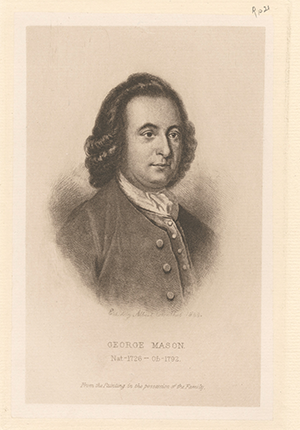Historic Document
The Virginia Declaration of Rights
Virginia House of Delegates | 1776

Emmet Collection of Manuscripts Etc. Relating to American History, The New York Public Library
Summary
During the American Revolution, the Continental Congress called on the states to write new constitutions. Many of these state constitutions included their own Declarations of Rights. The most influential of these charters of freedom was the Virginia Declaration of Rights—authored primarily by George Mason. Adopted by the Virginia House of Delegates in June 1776, the Virginia Declaration of Rights was part of the 1776 Virginia Constitution. Later, Thomas Jefferson drew inspiration from the Virginia Declaration’s vision of natural rights when drafting the Declaration of Independence. State constitution-writers borrowed language from the Virginia Declaration when framing their own state constitutions. And a little over a decade later, James Madison kept the Virginia Declaration by his side when crafting a Bill of Rights for the U.S. Constitution.
Selected by

The National Constitution Center
Document Excerpt
(1) That all men are by nature equally free and independent, and have certain inherent rights, of which, when they enter into a state of society, they cannot, by any compact, deprive or divest their posterity; namely, the enjoyment of life and liberty, with the means of acquiring and possessing property, and pursuing and obtaining happiness and safety.
(2) That all power is vested in, and consequently derived from, the people; that magistrates are their trustees and servants, and at all times amenable to them.
(3) That government is, or ought to be, instituted for the common benefit, protection, and security of the people, nation or community; of all the various modes and forms of government that is best, which is capable of producing the greatest degree of happiness and safety and is most effectually secured against the danger of maladministration; and that, whenever any government shall be found inadequate or contrary to these purposes, a majority of the community hath an indubitable, unalienable, and indefeasible right to reform, alter or abolish it, in such manner as shall be judged most conducive to the public weal. . . .
(5) That the legislative and executive powers of the state should be separate and distinct from the judicative; and, that the members of the two first may be restrained from oppression by feeling and participating the burthens of the people, they should, at fixed periods, be reduced to a private station, return into that body from which they were originally taken, and the vacancies be supplied by frequent, certain, and regular elections in which all, or any part of the former members, to be again eligible, or ineligible, as the laws shall direct.
(6) That elections of members to serve as representatives of the people, in assembly ought to be free; and that all men, having sufficient evidence of permanent common interest with, and attachment to, the community, have the right of suffrage and cannot be taxed or deprived of their property for public uses without their own consent or that of their representatives so elected, nor bound by any law to which they have not, in like manner, assembled for the public good.
(7) That all power of suspending laws, or the execution of laws, by any authority, without consent of the representatives of the people, is injurious to their rights and ought not to be exercised.
(8) That in all capital or criminal prosecutions a man hath a right to demand the cause and nature of his accusation to be confronted with the accusers and witnesses, to call for evidence in his favor, and to a speedy trial by an impartial jury of his vicinage, without whose unanimous consent he cannot be found guilty, nor can he be compelled to give evidence against himself; that no man be deprived of his liberty except by the law of the land or the judgement of his peers.
(9) That excessive bail ought not to be required, nor excessive fines imposed; nor cruel and unusual punishments inflicted.
(10) That general warrants, whereby an officer or messenger may be commanded to search suspected places without evidence of a fact committed, or to seize any person or persons not named, or whose offense is not particularly described and supported by evidence, are grievous and oppressive and ought not to be granted. . . .
(12) That the freedom of the press is one of the greatest bulwarks of liberty and can never be restrained but by despotic governments.
(13) That a well regulated militia, composed of the body of the people, trained to arms, is the proper, natural, and safe defense of a free state; that standing armies, in time of peace, should be avoided as dangerous to liberty; and that, in all cases, the military should be under strict subordination to, and be governed by, the civil power. . . .
(15) That no free government, or the blessings of liberty, can be preserved to any people but by a firm adherence to justice, moderation, temperance, frugality, and virtue and by frequent recurrence to fundamental principles.
(16) That religion, or the duty which we owe to our Creator and the manner of discharging it, can be directed by reason and conviction, not by force or violence; and therefore, all men are equally entitled to the free exercise of religion, according to the dictates of conscience; and that it is the mutual duty of all to practice Christian forbearance, love, and charity towards each other.




